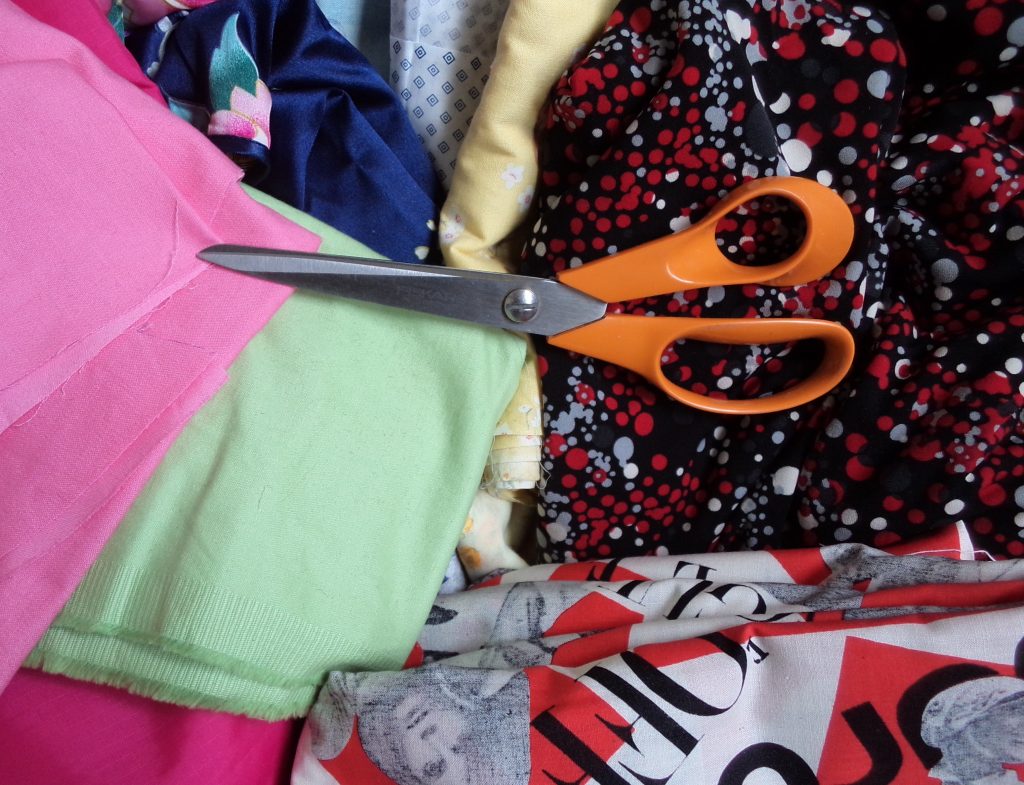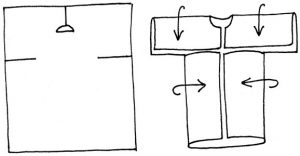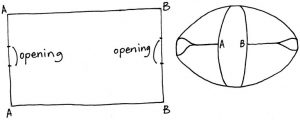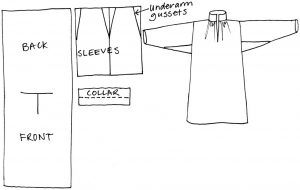Considering zero waste fashion

Last week’s Wearing a square jacket has caused me to think about the concept of sustainable and zero waste fashion.
I’m reading A Practical Guide to Sustainable Fashion by Alison Gwilt (library), and Shaping Sustainable Fashion edited by Alison Gwilt and Timo Rissanen (lent by my fashion designer friend Chiggy Schiller). I’ve just ordered Zero Waste Fashion Design by Holly McQuillan and Timo Rissanen.
The part that interests me most of sustainable fashion design is zero waste. It’s cutting out a garment without any scraps, using every part of the fabric so none is wasted. This isn’t a new thing; lots of folk and traditional clothes do it, for example kimonos, ponchos, caftans, saris, sarongs, and kilts. Even if the garment uses a great deal of fabric, like a sari, there isn’t any actual waste.
Here are some more examples:

A bog coat (or jacket). Look on Ravelry for knitted ones.

What do you call these? In Grandma’s knitting books they’re called a Hug-me-tight, but John Galliano did a glamorous brocade one for the Dior Spring/Summer 1989 (the Stourhead ensemble).

A shirt with the pieces cut from the width of the fabric. Dorothy Burnham’s book Cut my Cote is full of examples like this one.
These kind of patternmaking challenges I find tremendously interesting and stimulating; they appeal to the core of why I became a patternmaker in the first place. Hoping to try out a few zero waste garments very soon.
Cheers!
Update: The book Zero Waste Fashion Design has arrived. Read my review of it here.

Good post. Very interesting concept. I have a few items that are too big. Could you do a blog about how to do that.
Hi Kay,
I can give you some tips right now:
1. Decide whether it’s worth it or not. If the garment is more than one size too big, the alteration may not be successful. If the garment is massively too big (like the brown trousers I turned into winter shorts back in May), it would be a case of unpicking and re-cutting the garment. Which the sustainable fashion people would totally approve of, by the way.
2. On trousers, preserve front pockets by taking in on the back only.
3. On tops, consider adding some shaping at the same time with back darts or side seam shaping.
4. If the fabric is fine enough, you might be able to take the garment in without undoing the hems -just run the stitching all the way through. If the fabric is thick, you’ll have to undo part of the hem, take the garment in, then re-stitch the hem.
All the very best with it,
Cheers, Liz
Thanks Liz. I must go thru my wardrobe soon, but I haven’t lost quite enough weight yet. Hopefully, I will get some new things for summer. I love looking in Savers too!
Love Kay
Hi Liz,
I am glad to hear that you are very into Zero Waste Fashion because I have not tired to delve deeper into it. But I like the idea of not wasting fabric like you. I had made kimono style top with chiffon as in your second hand drawn diagram but I did not wear it so much. But I did not want to just throw that away so I unpicked here and there and turned into the interesting piece. It is a bit uncomfortable to wear but I personally love it. You can see the image below.
https://www.facebook.com/902430833143023/photos/a.902461963139910.1073741828.902430833143023/948987418487364/?type=3&theater
I hope you will enjoy your new book that you ordered and looking forward to seeing your new creation! Thanks for your post!!!
Hi Chiggy, thanks for commenting and for the link. I haven’t sewn a bog jacket (I’ve knitted one) but maybe it’s most successful when it’s cut as a looser style in fluid fabric? I also read that some people made coats and dressing gowns out of the pattern. Threads magazine has a how-to pdf at https://www.threadsmagazine.com/assets/pdf-download/Custom-cost.pdf
Cheers!